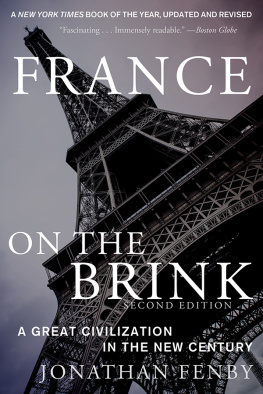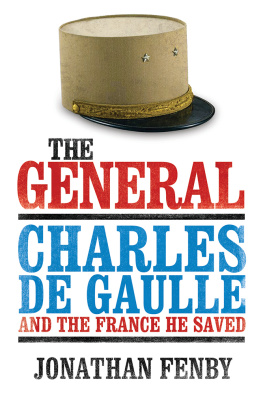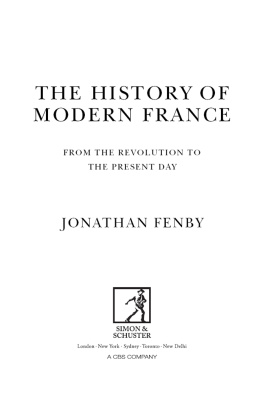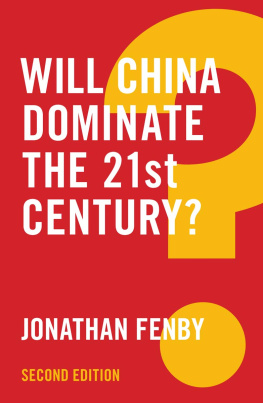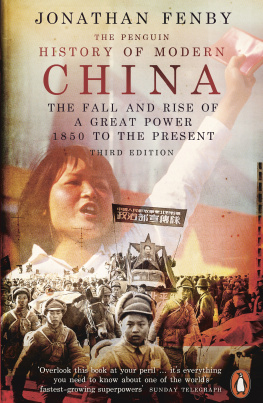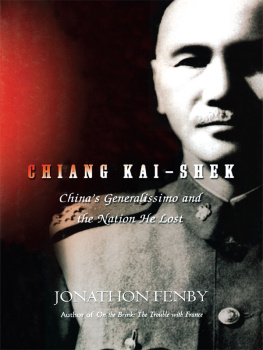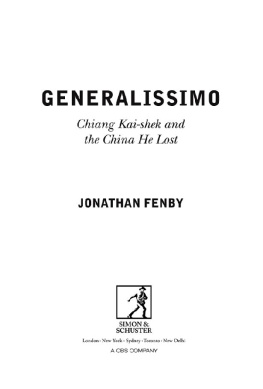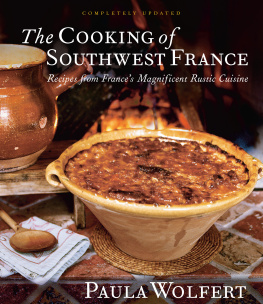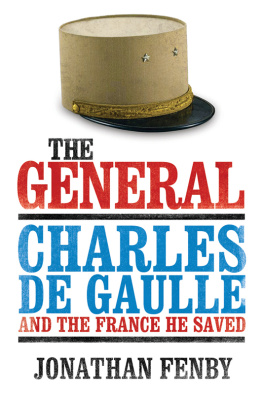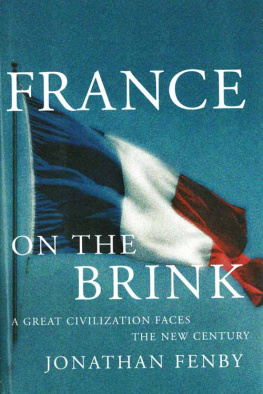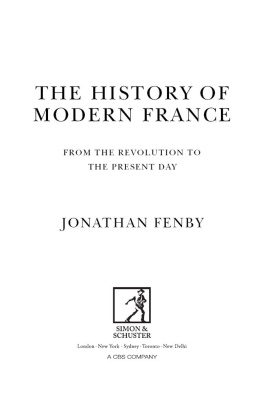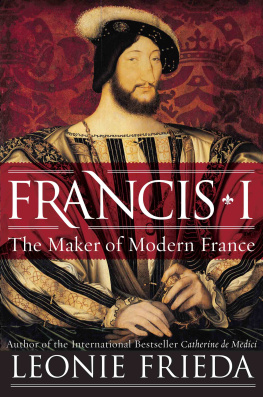Also by Jonathan Fenby
Will China Dominate the 21st Century?
The Battle of Tsingtao
Tiger Head, Snake Tails: China Today
The General: Charles de Gaulle and the France He Saved
The Penguin History of Modern China
Alliance
The Sinking of the Lancastria
Chinas Journey
The Dragon Throne; Chinas Imperial Dynasties
The Seventy Wonders of China
Generalissimo: Chiang Kai-shek and the China He Lost
Dealing with the Dragon
Comment peut-on tre franais?
Piracy and the Public
The International News Services
The Fall of the House of Beaverbrook
Copyright 1998, 1999, 2014 by Jonathan Fenby
All Rights Reserved. No part of this book may be reproduced in any manner without the express written consent of the publisher, except in the case of brief excerpts in critical reviews or articles. All inquiries should be addressed to Arcade Publishing, 307 West 36th Street, 11th Floor, New York, NY 10018.
Second Edition
Material from , A French Life, first appeared in different form in the Guardian Weekend magazine in 1995.
Map by Neil Hyslop
Arcade Publishing books may be purchased in bulk at special discounts for sales promotion, corporate gifts, fund-raising, or educational purposes. Special editions can also be created to specifications. For details, contact the Special Sales Department, Arcade Publishing, 307 West 36th Street, 11th Floor, New York, NY 10018 or .
Arcade Publishing is a registered trademark of Skyhorse Publishing, Inc., a Delaware corporation.
Visit our website at www.arcadepub.com.
10 9 8 7 6 5 4 3 2 1
Library of Congress Cataloging-in-Publication Data is available on file.
Cover design by Brian Peterson
Cover photo by Thinkstock
ISBN: 978-1-62872-317-5
Ebook ISBN: 978-1-62872-406-6
Printed in the United States of America
To the memory of
Alter and Fanny
C ONTENTS
P REFACE
T he first time I went to France, I didnt like it much. My godmother had invited me to join her on holiday in Brittany in the late 1950s to look after her children. I have two memories of the trip: daringly calling out, Ah, les flics! at the police on the seafront and trying to learn to sail on a boat with a grizzled Frenchman who kept yelling about le foc the mizzen sail, not a Breton approximation of a four-letter swear word.
Forty years later, I was sitting in my office by the harbour in Hong Kong, having edited the South China Morning Post through the territorys return to China. It had been a breathless summer, with no time to think of anything except work. One Wednesday in August, I was seized by a single thought. My wife was in France, taking the waters at an obscure spa in the wilds of the Cvennes. In three days time, she and three of our closest friends would drive to a favourite restaurant and hotel in a medieval village by the Aveyron River. My diary was embarrassingly empty. So I booked a ticket for that night, flew to Paris, changed airports and boarded a little plane to the town of Rodez. Once there I hired a car, drove twenty miles, and was sitting in the garden by the river when they drove over the humpbacked bridge on Saturday afternoon.
France gets you that way. Its lure is the reason for this book. I had wanted to write an account of the state of France for some time; what got me started was the virulence and scale of the protests that were set off by President Chiracs decision to resume nuclear testing in the summer of 1995. Why, I wondered, did France arouse such strong emotions? What is it that is so unusual about this nation and its people? And then, looking at the morosity which spread across the country from the mid-1980s, how does one reconcile the superior sheen which France displays to the world with the realities of double-digit unemployment, rising to 3.3 million in defiance of presidential pledges to bring it down, a rampant extremist party of the far right and a people who reject the elite that has ruled them for decades?
Without a healthy France, there is no Europe. That is why the state of the land between the Atlantic and the Rhine, the Mediterranean and the Channel matters so much, and why, for all the pleasures and stimulation it offers, France needs to get a grip on itself.
For a foreigner to try to grapple with such matters may seem arrogant. But I hope that three decades spent either living in France or watching it closely from abroad have enabled me to take the pulse of the nation, though I know that many friends living in Paris, the Berry or the Auvergne would disagree with my concerns about their country. My starting point is certainly not that of a Francophobe; rather more that of a lover who entertains some fundamental worries about the object of his affection.
The first edition of this book was published in 1998. France was in a quite confident mood as the last century ended. When a French version appeared, I was taken to task especially by reviewers in right-wing newspapers for my criticisms of the country. A leading commentator in Le Figaro noted that I claimed to be a friend of France and concluded with the clich that with friends like M. Fenby, France does not need enemies. I can only note that the same newspaper has taken to levelling the same kind of criticisms at the way the country is run as I laid out at the time. I would claim that the weaknesses and strengths, which I identified first time round, remainand, indeed, have in some cases been magnified on the debit side. However, while still on the brink, France has not toppled over. How it has managed this is one of the themes of this new edition.
So much has happened in the last fifteen years that this is really a new book, but I hope it has the advantage of putting the current state of the country in a longer historical context stretching back to Charles de Gaulle and the founding of the Fifth Republic in 1958, with particular focus on the period since Franois Mitterrand became the first President of the Fifth Republic to be elected on a left-wing platform. Those three decades form a continuum which both explains the brink along which France is walking and how its politicians, of right and left, have repeatedly chosen short-term fixes or indulged in evasion of harsh realities to perpetuate that state of affairs, leading to the current uncertainties lapping round the presidency of Franois Hollande. The book seeks, therefore, both to present a portrait of France today and a longer-range account of the evolution of the country, from the centres of power in Paris to the provinces, from the economy to gastronomy, from the immigrant issue to the fading of old icons with the backdrop of the history that has formed the nation.
It is based on half a century of experience, encounters and observation both personal and drawn from my work as a journalist in France for Reuters, the Economist, the Times, the Guardian , the Independent, the Observer and other publications in Britain and the United States. I could never have undertaken this book, let alone finished it, without the help of my wife, who has given me roots-by-marriage in France and whose assistance has been as invaluable as it has been rigorous. Hundreds of people have contributed to my knowledge of France and given me material for this book. I owe a special debt to my colleagues in the French press and broadcasting; in particular to LExpress, Le Monde , Libration , Le Figaro, Le Nouvel Observateur , Le Point and RTL. I have indicated their specific contributions at various points in the text, but, beyond that, they have given me a far broader insight into France over the years as friends and colleagues.

